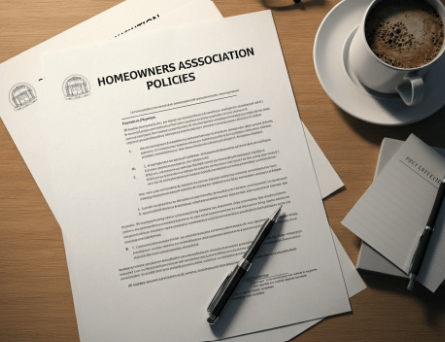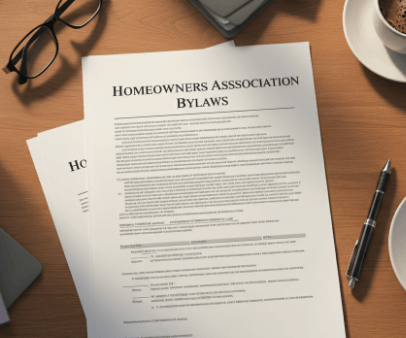Navigating the intricacies of homeownership within a community can often seem daunting, especially when understanding the overarching rules and regulations governing communal living spaces. One of the most critical components of this governance is the bylaws set forth by a Homeowners’ Association (HOA). But what are bylaws in an HOA, and why are they so significant? In this blog, we’ll explore the essence and the importance of bylaws within an HOA framework, providing clarity on what are bylaws in an HOA and how they influence both the HOA and the homeowners it serves. Whether you’re a new homeowner or simply looking to deepen your understanding of your community’s operation, this guide is your starting point for uncovering the foundations that help maintain harmony and order within residential communities.
Real estate investors like Steve Daria and Joleigh often emphasize the significance of thoroughly understanding what are Bylaws in an HOA before investing in community living spaces. Their collective experiences underscore how these bylaws can profoundly influence the investment’s value and the quality of life within the community.
What Are Bylaws in an HOA?
What are Bylaws in an HOA? Bylaws in an HOA are essentially the guidelines for the administration and regulation of the association.
They outline the officers’ duties, election procedures, meeting frequencies, and members’ rights and responsibilities, among other operational directives.
These documents are crucial for maintaining order and ensuring the association runs smoothly and effectively.

Why Bylaws Matter
Bylaws serve as the legal backbone of an HOA, providing a clear framework for decision-making and conflict resolution.
They ensure that the rights of homeowners are protected while promoting the community’s common good.
Knowing these rules is essential for anyone involved in an HOA to foster a harmonious living environment.
Get An Offer Today, Sell In A Matter Of Days
Critical Components of HOA Bylaws
Understanding the critical components of HOA bylaws is essential for current and prospective homeowners association members.
These bylaws govern how the HOA operates, outlining rules and responsibilities that ensure the community’s smooth functioning and preservation of property values.
Governance Structure
The bylaws outline the governance structure of the HOA, including the composition of the board of directors, their terms, powers, and duties.
This information is crucial for maintaining a fair and functional leadership team that serves the community’s best interest.
Member Rights and Responsibilities
Bylaws delineate the rights and responsibilities of the HOA members, highlighting what is expected of each resident.
This section is essential for new and existing members to understand their role within the community and how to comply with regulations.
Meeting Protocols
The bylaws in an HOA specify how meetings are conducted, including annual meetings, special meetings, and board meetings.
Knowing the meeting protocols is vital for effective participation and governance within the HOA.
Financial Management
One of the most critical sections of the bylaws addresses the HOA’s financial management.
This includes budgeting, assessments, dues, and how funds are allocated.
Understanding this component ensures that members know their financial obligations and how their money is being used to benefit the community.
Enforcement of Rules
Lastly, the bylaws must detail the procedures for enforcing the HOA’s rules and regulations.
This includes addressing violations, imposing fines, and handling disputes.
Familiarizing yourself with these processes can help prevent conflicts and ensure that issues are resolved fairly and efficiently.
Strategies for Navigating HOA Bylaws
Navigating the intricacies of HOA bylaws can often seem daunting, yet understanding these rules is pivotal for harmonious community living.
This section will delve into actionable tips and valuable insights, empowering residents and board members to interpret and implement these regulations skillfully.
Read and Review Regularly
The first step in demystifying bylaws in an HOA is to read and review them thoroughly.
Take notes, highlight important sections, and ask questions if anything needs clarification.
Seek Clarification
Feel free to seek clarification from the HOA board or consult with a legal expert familiar with community association law.
You must fully understand the bylaws to ensure compliance and advocate for your rights when necessary.

Stay Informed about Amendments
HOA bylaws serve as the foundation for governing the community, outlining rules and regulations that homeowners must abide by.
However, these bylaws are not set in stone and can be amended to adapt to changing circumstances or address evolving needs within the community.
Therefore, homeowners must stay informed about any changes to the bylaws to ensure they remain amenable and aware of their rights and responsibilities.
Regularly attending HOA meetings is one of the most effective ways to stay informed about bylaw amendments.
These meetings provide homeowners valuable opportunities to learn about proposed changes, voice their opinions, and participate in decision-making.
By actively engaging in HOA meetings, homeowners can stay abreast of any discussions or votes related to bylaw amendments and gain insight into the rationale behind proposed changes.
Get Involved
One of the best ways to influence the bylaws in an HOA is to get involved. Whether serving on the board, participating in committees, or attending meetings, active engagement can give you a voice in decision-making.
Know Your Rights
Understanding your rights under the bylaws and state law is critical for protecting your interests as a homeowners association (HOA) homeowner.
Bylaws are foundational documents delineating the rules, regulations, and operational procedures for overseeing and administering the HOA.
They establish guidelines for board elections, assessment collection, architectural guidelines, and dispute resolution processes.
Conclusion
In conclusion, ‘What are Bylaws in an HOA’ are more than just rules – they are the foundation for a prosperous and harmonious community. Understanding these guidelines is crucial for promoting transparency, fostering effective governance, and protecting the rights of all members. By following the strategies above and staying informed, you can confidently navigate your HOA’s rulebook and contribute to the success of your community. So, don’t be intimidated by the bylaws in an HOA – they are there to guide and support you in creating a thriving living environment for all members.
**NOTICE: Please note that the content presented in this post is intended solely for informational and educational purposes. It should not be construed as legal or financial advice or relied upon as a replacement for consultation with a qualified attorney or CPA. For specific guidance on legal or financial matters, readers are encouraged to seek professional assistance from an attorney, CPA, or other appropriate professional regarding the subject matter.

